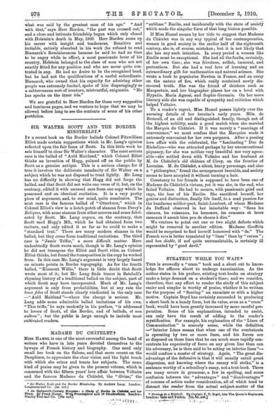MADAME DU CHATELET.f
Miss HAMEL is one of the most successful among the band of writers who have in late years devoted themselves to the byways of French history and biography. One need only recall her book on the Salons, and that more recent on the Dauphines, to appreciate the clear vision and the light touch with which she seizes and treats her subjects. The same kind of praise may be' given to the present volume, which is concerned with the fifteen years' love affair between Voltaire and the famous Madame du Chitelet, the "divine," the• Sir Walter Scott and the Border Minstrelsy. By Andrew Lang. London: Loagmana and Co. [6B. net.] t Eighteenth-0..4*w Mgr/wipes a Seely of CiftlipLasod her Wawa. tly FranX,Bampl. With Frontispiece Rad 10 Illustrotgong, Eent Stanley Paul ttn0 CO. [leg. net). " sublime " Emilie, and incidentally with the state -of society which made the singular form of that long liaison possible.
If Miss Hamel means by her title to suggest that Madame du Chhtelet was in any way typical of her contemporaries, women in good society in the earlier half of the eighteenth century, she is, of course, mistaken; but it is not likely that she has any such intention. In every period a woman like Emilie must be exceptionaL She had all the faults, certainly, of her own time; she was frivolous, selfish, immoral, and pretentious. But she had a real love of learning and an extraordinary gift for mathematics and natural science. She wrote a book to popularise Newton in France, and an essay on the nature of fire, which really contained newly dis- covered truth. She was the friend of thinkers such as Maupertuis, and her biographer 'places her on a level with Hypatia, Maria Agneai, and Sophie Germain. On her more literary aide she was capable of sympathy and criticism which helped Voltaire.
To a reader's regret, Miss Hamel passes lightly over the amusing details of her heroine's early years. Mlle. do Breteuil, of an old and distinguished family, though not of the .highest nobility, made a good match when she married the Marquis du Chhtelet. If it was merely a "marriage of convenience," we must confess that the Marquise made it extremely convenient for her own purposes. After a passing love affair with the .celebrated, the " fascinating " Duo de Richelieu—who was attracted perhaps by her unconventional piquancy, for she was neither very beautiful nor very agree- able—she settled down With Voltaire and her husband at M. du Chittelet's old chilleati of Cirey, on the frontier of Lorraine. M. du Chatelet, a silent, heavy personage, and also a "philosopher," found the arrangement bearable, and society seems to have accepted it without turning a hair.
Constancy to her friends is supposed to have been one of Madame du Chitelet's virtues, yet it was she, in the end, who failed Voltaire. He had to mourn, with passionate grief and rage, the loss of his Emilie. She sacrificed herself, her genius' and distinction, finally life itself, to a mad passion for the handsome soldier-poet, Saint-Lambert, of whom Madame du Deffand observed in her inimitable way : "Sans lea oiseaux, les ruissea.ux, lea hameaux, lea ormeaux et leurs rameaux II aurait bien pen de °hoses h dire."
We venture to point out one or two slight defects which might be removed in another edition. Madame Geoffrin would be surprised to find herself honoured with "de." The French vers is better translated by " lines " than by " verses " ; and ban diable, if not' quite untranslatable, is certainly ill represented by "good devil."










































































 Previous page
Previous page